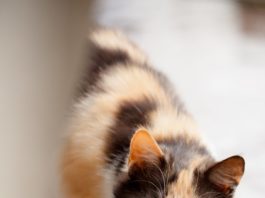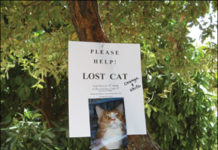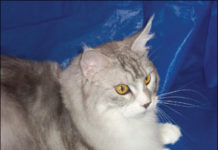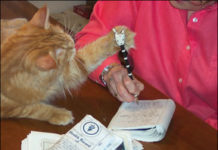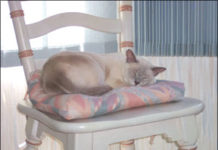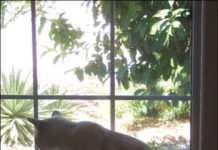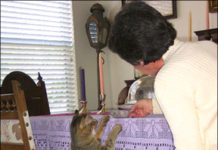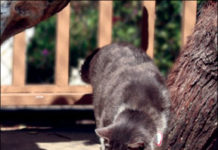Short Takes: 08/07
For some reason, this scientific report made us think of the "whoosh!" sound when a can of coffee is opened: "Use of vacuum-assisted closure for management of a large skin wound in a cat" (Journal of the American Veterinary Medical Association Vol. 230, No. 11). The relatively new technique - pioneered in human surgery cases and tested recently by veterinary surgeons on a nine-month-old cat that was struck by a car - calls for wrapping the wounded area in sterile plastic foam. Then a vacuum pump sucks out the air between the skin and the foam blanket so that the animal, essentially, was shrink-wrapped. The treatment pulls skin together until it heals (the cat needed skin grafts for its serious injury), helps keep out infection and stabilizes the body temperature.
Your Cat’s Whiskers
The old-fashioned term "the cats whiskers" means "the height of perfection" or "first-rate." Popular in the 1920s, this expression, along with "the cats meow," referred to the daring flappers described as "impossible to shock." While the term is American in origin, people have disagreed over who deserves credit for coining it. The lexicographers William and Mary Morris believe both "cat" expressions originated in girls schools. Other sources say American sportswriter and cartoonist Thomas Dorgan (1877-1929) invented the expression at the turn of the 20th century.
A Feline Dear Diary
If your cat kept a diary, it might read something like this: Yesterday, I slept, ate, slept some more, chased a paper ball, napped, ate again and napped. While that may describe a cats typical day, it wont necessarily help you or your veterinarian if your cat develops a health or behavior problem. "Keeping a diary for your cat is a good idea in general, but particularly when your [IMGCAP(1)]cat is ill," says Drew Weigner,…
What Might Changed Behavior Mean?
When a cat is not doing well, for whatever reason, she depends upon her special person to take notice. Usually, some behavioral change will be observed. The behavioral change is the clinical sign that drives a person to consult with his veterinarian. Veterinarians receive complaints ranging from the very specific "My cat is sneezing" to the very elusive "My cat is just not herself." These behavioral changes are the indicators that a cat needs attention.
Finding a Cat a New Home
Your sister is moving to Japan for her job and she cant take her cat with her. Shes devastated and turns to you for help. But you already have three cats and cant take on another. You cant imagine ever having to give up one of your own cats, but dealing with your sisters situation is almost as bad. What do you do? Someday, you may need to find a home for your own cat. But there are a number of things to try before deciding that a cat cannot stay where she is. And if it becomes absolutely necessary, heres some help in finding her a new home.
Can’t We All Just Get Along?
The age-old admonishment never to bite the hand that feeds us is a good-sense reminder not to alienate those we depend on for comfort and security. But this metaphor is, of course, based in the reality that pets sometimes do bite the hand that feeds them. A bite from a family pet is at the very least viewed as an insult. At its worst, the bite generates anger or even fear. Not to mention the physical pain and possibility of infection.
Water Babies
This month I received two letters describing cats that play with water. One of the cats dips her paws into the water bowl until the bowl is empty. The larger the bowl, the larger the puddle on the floor. Actually, that bowl has now been moved to the bathtub. (Still a mess, I am told.)
How Our Cats Train Us
Dogs may have masters. We cats have staff. Keep this in mind for a happy human relationship." So writes Celia Haddon in One Hundred Ways for a Cat to Train its Human (Hodder & Stoughton, 2001).Do you ever find yourself playing servant to your cat? Maybe youre working on the computer and your crafty cat lies down across the keyboard to get your attention. It works, of course. Next thing you know, youre stroking the cat instead of striking the keys
Short Takes: 04/07
Ever since Gertie, the late great Short Takes muse, developed urinary tract disease - then went on a special renal diet and subsequently developed hypertension (high blood pressure) and went blind because her retinas detached - weve wondered: Which was worse, the disease or the effects of the treatments?
How to Catch Your Cat
Diane Levesque of Rochester, New Hampshire, adopted a kitten that had been born in the wild. One day her kitten got loose outside, and Levesque was frantic. "I could see her near the garage, but I couldnt catch her," she recalls. She set a trap with food to lure her cat, but it didnt work. Finally, she called her veterinarian to see how she could get her cat back inside. It turned out that Levesques cat, like many other felines, didnt want to step on the traps metal floor.
Does Your Cat Need Help?
Inappropriate urination or defecation. Aggression. Inappropriate scratching or destructive behavior. Eating or chewing non-food materials. Cat carrier avoidance. Separation anxiety. Other fears and phobias. When your cat develops a behavior problem, you may need professional advice. But whom should you call? Your veterinarian should be first on the list. But for particularly difficult problems, he or she may enlist the help of a certified applied animal behaviorist or a board-certified veterinary behaviorist. While either one can help you solve your cats adjustment difficulty, there are some differences in the services each provides.
Bad Table Manners?
If your cat has ever scratched the floor before or after eating a meal, attempted to cover uneaten food, or (yuck!) plopped a toy into her food or water dish, please raise your hand. Right now, many of you are probably waving your hand in the air and nodding your head knowingly. If suppertime at your house has more the ambience of a junior high school cafeteria than a chic caf, read on. Our Cornell experts help make sense of some of our cats quirkiest food-related behaviors.





